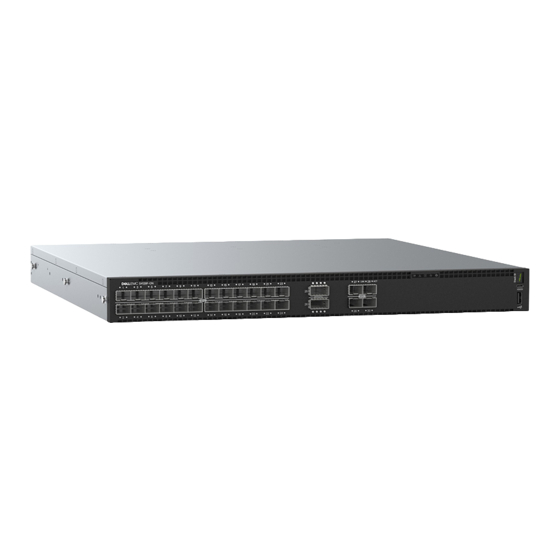
•
1 stop bit
•
No flow control
USB storage
USB storage does not automatically mount. The supported file system is FAT. To use USB storage, first mount the device using the
following steps:
1
Create a mount directory for the USB.
ONIE:/ # mkdir /mnt/usb
2
View the fixed disks using fdisk.
ONIE:/mnt # fdisk -l
For internal storage:
Disk /dev/sda: 15.8 GB, 15829303296 bytes
255 heads, 63 sectors/track, 1924 cylinders
Units = cylinders of 16065 * 512 = 8225280 bytes
Device Boot
/dev/sda1
For USB storage:
Disk /dev/sdb: 30.9 GB, 30942946304 bytes
64 heads, 32 sectors/track, 29509 cylinders
Units = cylinders of 2048 * 512 = 1048576 bytes
Device Boot
3
Mount the device /dev/sdb to the /mnt/usb directory.
ONIE:/ # mount -t vfat /dev/sdb /mnt/usb
NOTE:
The following message displays if the /mnt/usb directory is missing: mount: mounting /dev/sdb
on /mnt/usb failed: No such file or directory.
NOTE:
The following message displays if the USB device is not seen: mount: mounting /dev/sdb on /mnt/usb
failed: No such device or address.
4
Add a device to the file systems table using the fstab command and mount the file systems—recommended.
ONIE:/ # vi /etc/fstab
# FSTAB entry for the ONIE-BOOT partition mounted on /boot
LABEL=ONIE-BOOT /mnt/onie-boot ext4
/dev/sdb
ONIE:/ # mount -a
USB-B console port access
The USB-B console port is on the I/O side of the S4100-ON Series.
The terminal settings are the same for the serial console port and the RS-232/RJ-45 console port:
•
115200 baud rate
•
No parity
•
8 data bits
•
1 stop bit
•
No flow control
When you connect the USB-B port, it becomes the primary connection and, while connected, all messages are sent to the USB-B port.
38
Management ports
Start
End
1
1925
Start
End
/mnt/usb
vfat
Blocks
Id System
15458303+ ee EFI GPT
Blocks
Id System
defaults,rw,errors=remount-ro 0
defaults
1
0
1
